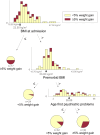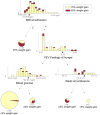Who is at risk for weight gain after weight-gain associated treatment with antipsychotics, antidepressants, and mood stabilizers: A machine learning approach
- PMID: 38561235
- PMCID: PMC11787916
- DOI: 10.1111/acps.13684
Who is at risk for weight gain after weight-gain associated treatment with antipsychotics, antidepressants, and mood stabilizers: A machine learning approach
Abstract
Background: Weight gain is a common side effect in psychopharmacology; however, targeted therapeutic interventions and prevention strategies are currently absent in day-to-day clinical practice. To promote the development of such strategies, the identification of factors indicative of patients at risk is essential.
Methods: In this study, we developed a transdiagnostic model using and comparing decision tree classifiers, logistic regression, XGboost, and a support vector machine to predict weight gain of ≥5% of body weight during the first 4 weeks of treatment with psychotropic drugs associated with weight gain in 103 psychiatric inpatients. We included established variables from the literature as well as an extended set with additional clinical variables and questionnaires.
Results: Baseline BMI, premorbid BMI, and age are known risk factors and were confirmed by our models. Additionally, waist circumference has emerged as a new and significant risk factor. Eating behavior next to blood glucose were found as additional potential predictor that may underlie therapeutic interventions and could be used for preventive strategies in a cohort at risk for psychotropics induced weight gain (PIWG).
Conclusion: Our models validate existing findings and further uncover previously unknown modifiable factors, such as eating behavior and blood glucose, which can be used as targets for preventive strategies. These findings underscore the imperative for continued research in this domain to establish effective preventive measures for individuals undergoing psychotropic drug treatments.
Keywords: antidepressants; antipsychotics; mood‐stabilizer; predictor; weight gain.
© 2024 The Authors. Acta Psychiatrica Scandinavica published by John Wiley & Sons Ltd.
Conflict of interest statement
Richard Musil has received financial research support from the EU (H2020 No. 754740), and served as PI in clinical trials from Abide Therapeutics, Böhringer‐Ingelheim, Emalex Biosciences, Lundbeck GmbH, Nuvelution TS Pharma Inc., Oryzon, Otsuka Pharmaceuticals and Therapix Biosciences. Peter Falkai received research support/honoraria for lectures or advisory activities from: Boehringer‐Ingelheim, Janssen, Lundbeck, Otsuka, Recordati, and Richter. All other authors declare that they have no conflicts of interest.
Figures



Similar articles
-
Antidepressants for pain management in adults with chronic pain: a network meta-analysis.Health Technol Assess. 2024 Oct;28(62):1-155. doi: 10.3310/MKRT2948. Health Technol Assess. 2024. PMID: 39367772 Free PMC article.
-
Systemic pharmacological treatments for chronic plaque psoriasis: a network meta-analysis.Cochrane Database Syst Rev. 2021 Apr 19;4(4):CD011535. doi: 10.1002/14651858.CD011535.pub4. Cochrane Database Syst Rev. 2021. Update in: Cochrane Database Syst Rev. 2022 May 23;5:CD011535. doi: 10.1002/14651858.CD011535.pub5. PMID: 33871055 Free PMC article. Updated.
-
Sertindole for schizophrenia.Cochrane Database Syst Rev. 2005 Jul 20;2005(3):CD001715. doi: 10.1002/14651858.CD001715.pub2. Cochrane Database Syst Rev. 2005. PMID: 16034864 Free PMC article.
-
Behavioral interventions to reduce risk for sexual transmission of HIV among men who have sex with men.Cochrane Database Syst Rev. 2008 Jul 16;(3):CD001230. doi: 10.1002/14651858.CD001230.pub2. Cochrane Database Syst Rev. 2008. PMID: 18646068
-
Metformin for women who are overweight or obese during pregnancy for improving maternal and infant outcomes.Cochrane Database Syst Rev. 2018 Jul 24;7(7):CD010564. doi: 10.1002/14651858.CD010564.pub2. Cochrane Database Syst Rev. 2018. PMID: 30039871 Free PMC article.
Cited by
-
BMIgap: a new tool to quantify transdiagnostic brain signatures of current and future weight.Res Sq [Preprint]. 2024 Dec 11:rs.3.rs-5259910. doi: 10.21203/rs.3.rs-5259910/v1. Res Sq. 2024. PMID: 39711565 Free PMC article. Preprint.
-
Developing a machine learning algorithm to predict psychotropic drugs-induced weight gain and the effectiveness of anti-obesity drugs in patients with severe mental illness: Protocol for a prospective cohort study.PLoS One. 2025 May 19;20(5):e0324000. doi: 10.1371/journal.pone.0324000. eCollection 2025. PLoS One. 2025. PMID: 40388412 Free PMC article.
-
Impact of Antidepressants on Weight Gain: Underlying Mechanisms and Mitigation Strategies.Arch Clin Biomed Res. 2025;9(3):183-195. Epub 2025 May 5. Arch Clin Biomed Res. 2025. PMID: 40444017 Free PMC article.
References
-
- Pillinger T, McCutcheon RA, Vano L, et al. Comparative effects of 18 antipsychotics on metabolic function in patients with schizophrenia, predictors of metabolic dysregulation, and association with psychopathology: a systematic review and network meta‐analysis. Lancet Psychiatry. 2020;7(1):64‐77. doi:10.1016/s2215-0366(19)30416-x - DOI - PMC - PubMed
LinkOut - more resources
Full Text Sources

